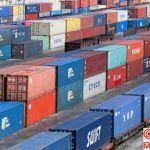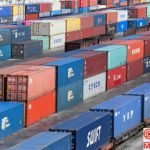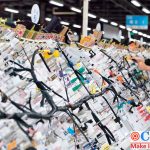The Epidemic In Southeast's Impact on the Global Industry Chain
Since June this year, the rapid spread of the Delta strain has triggered a new round of outbreaks in Southeast Asia, with record numbers of new confirmed cases in many countries. With the aggravation of the epidemic and the escalation of preventive measures, many factories in Southeast Asian countries had to reduce or shut down their production, making the already fragile global supply chain suffered a new blow.
Since last year’s outbreak until June this year, Vietnam has never had more than 1,000 confirmed cases per day, and in 2020, Vietnam’s GDP grew by 2.9 percent, one of the few countries in the world to achieve positive growth. But the epidemic in Vietnam deteriorated rapidly in July this year, reaching an average of about 8,000 new confirmed cases per day by early August. Major cities such as Hanoi and Ho Chi Minh City have implemented strict city closures, shutting down all but essential industries.
The epidemic has seriously hit the garment industry in Vietnam, and the supply chains of well-known brands have been affected. Bao Thanh Industry, which OEMs for major brands such as Nike and Adidas, had to suspend production in Vietnam. Bao Cheng Industry’s largest factory in Vietnam is located in Ho Chi Minh City, employing more than 60,000 people. The factory has been shut down since July 14, and factories in other parts of Vietnam have also started to reduce production. Another shoe giant, Phung Thai, also has a number of Vietnamese factories shut down.
The Vietnam Textile and Apparel Association estimates that the new outbreak has temporarily shut down 30 to 35 percent of garment factories across Vietnam and disrupted more than 90 percent of the supply chain of Vietnam’s garment industry. Even in the most optimistic scenario, the scale of Vietnam’s garment exports this year will only reach $32 billion to $33 billion, far below the target of $39 billion.

The garment industry is the backbone of Vietnam’s economy. The massive shutdown of garment factories not only hinders Vietnam’s economic recovery, but also makes many well-known brands that are highly dependent on Vietnam face serious supply chain problems. Adidas warned on August 5 that supply chain problems would cost Adidas 500 million euros in sales this year.
In addition to the apparel industry, the chip industry and the electronics industry supply chain also snowballed due to the epidemic in Southeast Asia, exacerbating the global shortage of chips. Global chip passive components have 15-20% are produced in Southeast Asia, of which Vietnam and Malaysia is particularly important. Affected by the epidemic, Samsung’s factory in Ho Chi Minh City, a reduction in production.
Like Vietnam, the epidemic in Malaysia also worsened this summer, and now the number of new confirmed cases reaches 20,000 per day, and is still on the rise.
Since July this year, Malaysia has also implemented very strict blockade measures. Since the production, testing and packaging of chips are labor-intensive industries, the chip industry is also very seriously affected by the anti-epidemic measures. The government has specifically granted permission for chip factories to operate with 60% of the manpower without having to close down. But since the global chip industry was already facing shortages before the current round of the epidemic in Southeast Asia, the disruption to the chip supply chain was further exacerbated by the reduction of production in Southeast Asian factories, even if it was only a reduction in production rather than a complete shutdown.
On the demand side, the epidemic has increased the demand for online offices, video games, etc., making the global demand for chips go up as well. The dual impact of reduced supply and increased demand means that the chip shortage may not end anytime soon. Flex, the world’s third largest electronics OEM, had predicted in June this year that the global chip shortage may not get better until the end of 2022. And with the Southeast Asian epidemic to further damage the chip manufacturing industry, this time is likely to be postponed backward.
In addition, the supply chain impact in Southeast Asia has also affected automotive production in other parts of the world. As cars become more intelligent, the use of chips in cars is becoming more and more widespread, and car production is increasingly constrained by the supply of chips in the epidemic. In recent years, Japanese automakers have shifted their supply chains to Southeast Asia, so this round of the epidemic has been particularly damaging to Japanese automakers. Toyota’s three factories in Japan were shut down due to supply chain problems in Vietnam, and Honda also had a factory shut down for a week for similar reasons.
The Southeast Asian epidemic has fully highlighted the urgency of the global supply chain crisis. In the first half of this year, as major economies around the world began the recovery process, supply chain issues became a key factor limiting the recovery. And by summer, the global supply chain, which has not yet recovered from the first wave of last year’s epidemic, was hit by multiple factors such as virus variants and extreme weather, coupled with a rebound in the global epidemic, putting a big question mark on the prospects for economic recovery.
CQI5 is committed to providing importers worldwide with product quality inspection services that far exceed those of our peers. If you are planning to import or have imported from China or Southeast Asian countries, please contact us cs’@’cqipro.com to learn more about how we can make your imports safer.
Disclaimer:
CQI5 article information from the Internet and contributions, the copyright of which belongs to the original author, and only represents the views of the original author. This website is only responsible for sorting out, typesetting and editing the articles, reproduced for the purpose of spreading more information, does not imply that it endorses its views or proves the truthfulness, completeness and accuracy of its content, and therefore does not assume any legal responsibility.
The information contained in this article is for reference only and is not intended as direct advice for decision-making.
If we inadvertently violate your copyright, please inform us, after verification, we will immediately correct or delete the content according to the requirements of the copyright holder, thank you! Contact, email: copyright@cqipro.com
This website has the final right to interpret this statement.
Welcome to reprint, please be sure to keep information complete.






